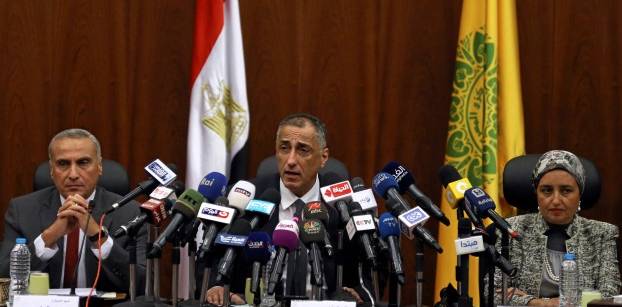Latest NEWS
- Aswat Masriya, the last word
- Roundup of Egypt's press headlines on March 15, 2017
- Roundup of Egypt's press headlines on March 14, 2017
- Former Egyptian President Hosni Mubarak to be released: lawyer
- Roundup of Egypt's press headlines on March 13, 2017
- Egypt's capital set to grow by half a million in 2017
- Egypt's wheat reserves to double with start of harvest -supply min
- Roundup of Egypt's press headlines on March 12, 2017
Egypt's Amer paints positive image of currency float
Egypt's Central Bank Governor Tarek Amer (C) speaks at a news conference in Cairo, Egypt, November 3, 2016. REUTERS/Mohamed Abd El Ghany
Egypt will receive in March the second $1 billion tranche of a $3 billion World Bank loan aimed at supporting a government economic reform programme, Central Bank Governor Tarek Amer said late on Friday.
The country has been negotiating billions of dollars in aid from various lenders to revive an economy hit by political upheaval since a 2011 revolt and to ease a dollar shortage that has crippled imports and hampered its recovery.
Facing a gaping budget deficit, Egypt began a series of painful economic reforms and has been taking steps to loosen capital controls, end energy subsidies, reform public enterprises and overhaul monetary policy.
The central bank floated the Egyptian pound in November to attract foreign capital, and the currency has weakened from 8.8 pounds to the U.S. dollar to roughly 20 pounds in December but rallied to around 16 pounds this week.
Prices have skyrocketed as Egypt depends heavily on imports. Core inflation soared to the highest in over a decade, hitting 30.86 percent in January.
"The inflationary shock has happened; liberalising the exchange rate will not have an effect on inflation again," Amer told local channel DMC in a televised interview.
He sought to paint a positive image of the float, saying it allowed the central bank to provide $1.5 billion for payments to international oil companies this year. Egypt imports $1 billion worth of fuel every month, he said.
Enough dollars, $13.5 billion, have flowed into local banks since November, allowing them to let foreign companies repatriate profits, Amer said, something they were unable to do for the past few years.
Egypt had roughly $36 billion in reserves before an uprising in 2011 ushered in a period of political turmoil, scaring away tourists and foreign investors, key sources of hard currency.
Reserves were almost halved by September but have been building up ever since the float, which helped Egypt clinch a $12 billion three-year loan from the International Monetary Fund, and were at $$26.363 billion by the end of January.
Amer expects foreign debt to reach $60 billion by June 2017. It stood at $55.76 billion in June 2016. Egypt has imported goods worth some $15 billion since the float, he said, but estimated that imports would fall 30 percent this year.
"The budget is coming under control, and we are now seeing fiscal discipline," he said.











